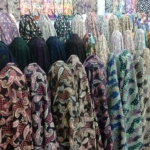Top 218 Textile Companies in Myanmar
The List of Top Verified Textile Companies in Myanmar. Last updated Oct 2024
We found 218 directory listings in Myanmar
Mya Kant Kaw
Address: 45(Rm 3057), 2nd Flr, Pyay Rd., Pyay (West) Ward, DGN, Yangon, Myanmar
706898, 8600090, 095165640
E-mail
5 Photos
Adiwarna Trading Co.,Ltd. [Silk Screen Printing]
Address: 15, Bawga Theiddi St., Ward (2), MYGN, Mayangone, Myanmar
521943, 521947, 4411305,
E-mail
Website
MADI KHIN
Address: 1-D Pyithayar Yeiktha Mya Yadanar Street Yankin Tsp Yangon, Myanmar
(01)-542686 95148196
E-mail
Website
NI NI LACE & TEXTILES
Address: 150-151 Banyar Dala Rd. Tamwe Tsp Yangon, Myanmar
(01)-724920 293284
E-mail
Website
One Two One Trading Co.,Ltd.
Address: 74, G Flr, 121th St., Yae Twin Gone Ward, MTNT, Myanmar
293230, 204023, 206192
E-mail
Website
Wi Thar Khar Co., Ltd.
Address: No2, Ywama Kyaung Street, Ward 1, Hlaing Township, Yangon, Myanmar
Verified+12 Years with us
+95-1-531 329
2010 Established
E-mail
Best Maker Co.,Ltd.
Address: 11, 146th St., Ah Yoe Gone Ward, TMWE, Myanmar
290523, 703015, 0973116117
E-mail
Daisy Kyaw Lin Int'l Trading Co., Ltd.
Address: 131, 3 Avenue St., Michaungkan (1) Qtr., Thingankyun Tsp, Myanmar
(01) 560807,700640
E-mail
HTAN ZAE CO., LTD. / HTAN ZAE INDUSTRIES GROUP
Address: Room 709 (7th Floor.) Junction 8 Tower B Myaing Hay Wun Condominium Kyaikwine Pagoda Stre Mayangon Tsp Yangon, Myanmar
(01)-707882 650417
E-mail
Lucky One Textile Mart (Ext. 1097)
Address: D-30/31, (G/F), Yuzana Plaza Mingalar Taung Nyunt Tsp, Myanmar
(01) 200747,09-5110578
E-mail
MANDALAY TEXTILE CO., LTD.
Address: Room 709 (7th Floor.) Tower B Myaing Hay Wun Condominium Kyaikwine Pagoda Rd. Mayangon Tsp Yangon, Myanmar
(01)-707882 650417
E-mail
PERFECT BROTHER'S CO., LTD.
Address: 82 6th Floor 124th Street Mingalar Taung Nyunt Tsp Yangon, Myanmar
(01)-203112
E-mail
POE NANT-THA CO., LTD.
Address: 12 Inya Rd. Kamayut Tsp Yangon, Myanmar
(01)-502382 526783 534107
E-mail
PROVENT CO., LTD. (EXT. 801)
Address: 37 Room 801 (8th Floor.) La Pyayt Wun Plaza A-Lan-Pya Pagoda Rd. Dagon Tsp Yangon, Myanmar
(01)-370837 370838 370839 242011
E-mail
SEIN KABAR TEXTILE CO., LTD. (EXT. 583)
Address: Room 619 (R) (6th Floor.) Nyaung Pin Lay Zay Plaza Lanmadaw Tsp Yangon, Myanmar
(01)-703838 222417 211233 95018011
E-mail
Thein Nyo (Ext. 545)
Address: 23/24, West C, Bogyoke Aung San Market Pabedan Tsp, Myanmar
(01) 256411,253195
E-mail
Filter by City
Related Categories
- Books1,409
- Brand Name1
- Camping and Outdoors38
- Cigars and Tobacco60
- Clothing and Accessories3,166
- Department Stores87
- Discount Stores0
- Duty Free Shop2
- Electrical Goods2,519
- Electronic Equipment1,860
- Fishing Equipment164
- Furniture916
- Gadgets1
- General Shopping3
- Gifts387
- Hardware Stores792
- Home and Garden2,186
- Jewellery2,069
- Kids744
- Marketplace8
- Mobile Phone Shops20
- Music94
- Online Shopping1
- Optical Shop341
- Outlets0
- Pet Shops0
- Second-hand Shop0
- Secondhand Stores0
- Shopping Centres10
- Shops1,630
- Textile218
